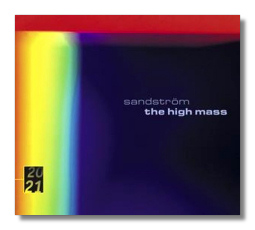
The Internet's Premier Classical Music Source
Related Links
- Latest Reviews
- More Reviews
-
By Composer
-
Collections
DVD & Blu-ray
Books
Concert Reviews
Articles/Interviews
Software
Audio
Search Amazon
Recommended Links
Site News
 CD Review
CD Review
Sandström / Lidholm

- Sven-David Sandström: The High Mass
- Ingvar Lidholm: Kontakion
Claudia Barainsky, Siri Torjesen, Sara Olsson, sopranos
Malena Ernman, Lilli Paasikivi, mezzo-sopranos
MDR Chor Leipzig
Gewandhaus Orchestra Leipzig/Herbert Blomstedt
Deutsche Grammophon 477511-1 DDD 2CDs: 44:49, 63:07
Like George Rochberg and Kryszstof Penderecki before him, at one point in his career Sven-David Sandström (b. 1942) started to move in the direction of neo-Romanticism. Prior to the 1980s, he was an adherent of serialism and other "academic" techniques. Now he "wants to move people," but "not necessarily by conveying only pleasant feelings, but also by challenging the audience." When this High Mass was premièred in 1994, some critics in his native Sweden cried foul, and complained that Sandström was pandering to the audience. With the release of this CD, similar voices have risen again, voices complaining that The High Mass is not "modern" enough. I find this silly, as, at least to my mind, modern music is written during modern times, and it is difficult to write music that isn't modern, unless one is intentionally aiming for pastiche. Silly complaints such as these led me to expect a safe and watered-down work, perhaps in the style of Lowell Liebermann. Fortunately, this isn't true either. From its opening chords, one knows that The High Mass is not all about nice sounds for tired listeners, although there are many sections of the score that are "beautiful" in a more or less traditional sense. Sandström's style is quite unusual, but if I had to compare it to something, I'd call it the intersection between John Adams and Olivier Messiaen. The music has an intriguingly insistent quality which is more than just repetition, and it also is intensely spiritual, almost to the point of feeling overheated, even hallucinatory. No matter what the Swedish critics say, this is hardly mere feel-good music for Auntie Sigrid.
Sandström uses a large orchestra, including many percussion instruments and an organ. The vocal writing for both soloists and chorus is demanding almost to the point of impracticality. (For example, try the beginning of the "Gloria," in which the chorus is asked to sing wickedly difficult figures again and again.) While the writing is demanding, it is also very effective and supremely responsive to the Latin texts. The soloists often sing together, and the harmonic interweaving of their individual lines has no precedent that I am aware of. The composer was inspired by Bach, and like the German master's Mass in B minor, Sandström has divided the five sections of the mass into discrete smaller sections. Choral and solo sections alternate. The language is not at all like Bach's, of course, but the same intensity is there. How appropriate it is that this recording was made during live performances in Bach's city of Leipzig! The performance seems perfect in every way, and it is clear that all of the musicians responded positively to Sandström's work, which is a gratifying example of how approachable music need not be dumbed-down.
The last 17 minutes of the second disc are devoted to a work by another Swedish composer – Ingvar Lidholm's Kontakion. Lidholm, born in 1921, taught Sandström in the 1960s, so their juxtaposition here is appropriate. Kontakion is an orchestral work, written in 1978 for the Royal Stockholm Philharmonic Orchestra to take with them on a tour to the Soviet Union. The title refers to a hymn from the Russian Orthodox tradition – a pointed choice, given the religious repression during Brezhnev's rule. Again, this is music of great spiritual intensity – thornier than The High Mass, but not beyond the reach of the curious listener. Even though Kontakion's structure may be elusive to listeners, its emotional content is quite clear. The opening moments of this score reminded me of Penderecki's Threnody for the Victims of Hiroshima – another "difficult" piece that proves to be very worthwhile once one simply surrenders oneself to it. Again, the recording dates from live performances in 2003, and finds the German musicians giving their all to the Swedish conductor. (Actually, Blomstedt was born in the United States, but he and his family returned to Sweden when he was young.)
Some people will tell you that The High Mass is not interesting. Don't believe them. This is one of the most provocative choral works to come my way in some time. Don't miss this CD.
Copyright © 2005, Raymond Tuttle




















